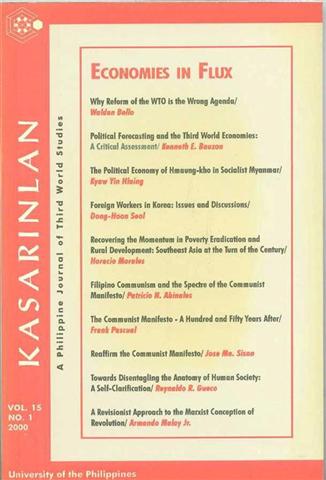The Poltical Economy of Hmaung-kho in Socialist Myanmar
Abstract
The Burmese Way to Socialism paved the way for the massive growth of the hmaung-kho in Myanmar. Hmuang-kho, the author’s term for all illegal economic activities in the country, accounts for more than half of Myanmar’s economy and has altered the economic, political and social landscape. A creation of the postliberation government, the hmuang-kho survived British trade restrictions. When the Revolutionary Council that took over in 1962 exerted control over the economy, the hmaung-kho sector flourished as state-run public stores drove Myanmarís poor to the black market. Later, the hmaung-kho provided more than just unavailable basic goods. It had given Myanmarís unemployed jobs and legally employed with additional income. It also contributed to the culture of corruption within the bureaucracy and higher government. These contributed in firmly establishing the hmuang-kho as both as a way of life in Myanmar and a better alternative to the Burmese Way to Socialism.
Published
2009-07-28
How to Cite
HLAING, Kyaw Yin.
The Poltical Economy of Hmaung-kho in Socialist Myanmar.
Kasarinlan: Philippine Journal of Third World Studies, [S.l.], v. 15, n. 1, july 2009.
ISSN 2012-080X.
Available at: <https://journals.upd.edu.ph/index.php/kasarinlan/article/view/1428>. Date accessed: 26 aug. 2025.
Section
Features
By submitting a manuscript, the authors agree that the exclusive rights to reproduce and distribute the article have been given to the Third World Studies Center.



